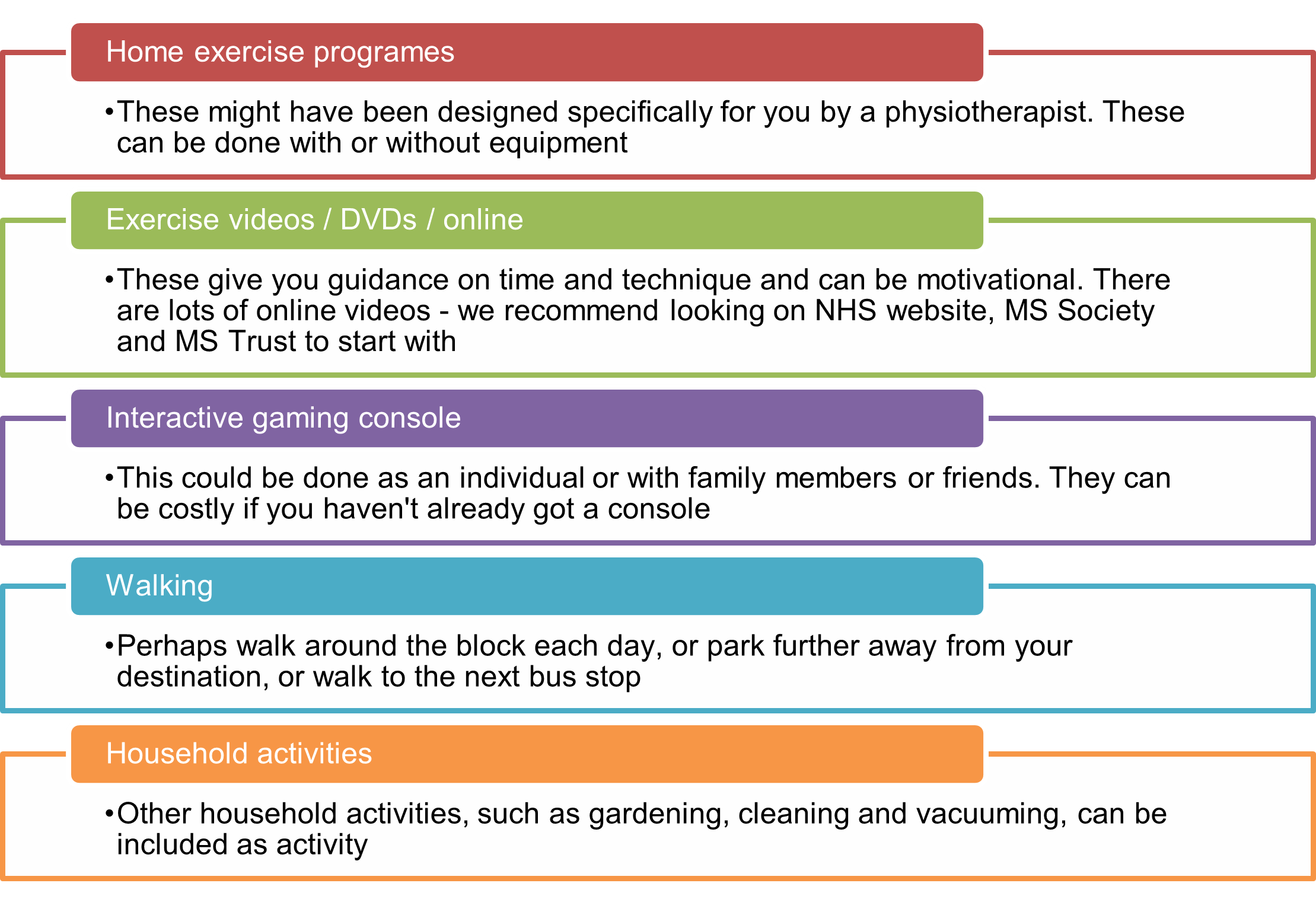Exercise and activity
Getting active can be achieved by either being more physically active or exercising. This can sometimes be challenging for people with MS. Over the last 20 years, there has been lots of research that has proved that exercise and activity is beneficial. It can manage symptoms of MS and improve your general health and wellbeing.
Physical Activity has been described as any body movement that works your muscles and uses more energy than you use when resting. This could include activities such as housework and gardening.
Exercise is planned, structured and repetitive to condition any part of the body. Exercise improves health, maintains fitness, and can be a type of physical rehabilitation.
Why is it important?
People who participate in regular physical activity can improve general fitness, lower the risk of chronic diseases (e.g., heart disease and Type 2 diabetes), and can help weight management alongside managing your diet – see diet. Being active can also help support your health as you get older.
Research shows that physical activity can help self-esteem, mood, sleep quality, and energy, as well as reducing your risk of stress, depression, and dementia.
Deconditioning in MS
It is known that people with MS are usually less active than other adults who don't move much. When you don't get enough exercise, your fitness can go down—this is called deconditioning.

Choosing the best activity for you
Physical activity is most helpful if it is done on a regular basis. You are more likely to be motivated if it is something you enjoy. It is worth trying a few activities to work out which ones you enjoy. You may choose just one activity, or find a few, that you want to continue a regular basis.
Getting Active at home
Doing activity at home has many benefits. It can be adapted around your lifestyle, and you can break the activity into smaller blocks. It is possible to use equipment at home that will help you to be active and achieve your goals.

Hints and tips when getting active at home:
- Environment - make sure that you have a clear and safe space
- Balance - consider something sturdy nearby to steady yourself
- Set yourself realistic targets that are achievable
- Routine - some people find it useful to exercise at the same time each day or set an alarm on your mobile phone
- 'Moments of movement' – exercise can be fitted into small time frames during the day, such as waiting for the kettle to boil, or when brushing your teeth
Getting active in the community
Joining a group activity
Socialising and being active with others can be motivational and help your wellbeing. A good instructor should be able to adapt exercises to your ability level, or provide an alternative exercise, whilst guiding the group.
In a group setting, it is important to take responsibility for making the instructor aware if you are finding certain exercises challenging and need to take a break due to your fatigue or feeling too warm. Everyone has different levels of fitness (whether they have MS or not), so don't compare yourself to other people or try to compete.
Joining the local gym
Most gyms will offer an induction to help develop a programme to meet your needs and make sure you know how to work the equipment. It is likely that within the gym there will be instructors with different levels of training and experience. If you feel that you have specific needs, mention this when booking the induction so they can offer you an appointment with a staff member best able to guide you through your induction and personal plan.
Choosing the right venue
When getting active in the community, consider the practicalities and how you would manage them. For example, how will you get to the venue, walking distance and accessibility? Are changing and toilet facilities suitable for your needs? Consider visiting venues prior to the activity you plan to participate in.
What options are available for me in Dorset?
- LiveWell Dorset | Health & Wellness Coaching | Free Advice & Support · LiveWell Dorset – this website is a great resource to help you find local classes which could be suitable for you and can also help you with coaching and support to improve your health and wellbeing
- Contact the local MS Society branch for details of exercises classes Dorset Group | MS Society
- Local community centres and church halls often have different community run exercises classes
- Choosing the right exercise | MS Trust – there are some useful links here to find local disability sport associations
- See Support Networks for some other local and virtual options
Tips when starting exercise
Start slowly and don't try to do too much, too soon. Let your body get used to the new activity and figure out which exercises are comfortable for you. Over time, you'll be able to gauge what your limits are.
Overheating
Heat sensitivity is a common MS symptom. If you find that you get hot and uncomfortable when you exercise, try to cool the environment you are in. Take off a layer of clothing, open a window or go outdoors. A fan or a cold-water spray might also be useful, as can having a cool bath or shower before you start to exercise.
Research shows that drinking iced water before exercising can help people with MS exercise for 30% longer and reduce fatigue following aerobic exercise.
Fatigue
It is important to recognise, both when exercising and in daily life, that it is not a good idea to 'push through' fatigue. You may end up feeling worse, often for days afterwards. It may be better to break your exercise into smaller chunks.
Choosing the right activity
These national websites have suggestions of activities and exercises that might suit your ability.
- Choosing the right exercise | MS Trust
- Simple exercises for MS | MS Society
- Exercise at Home - WheelPower
Locally there are also these options for those who live in East Dorset.









